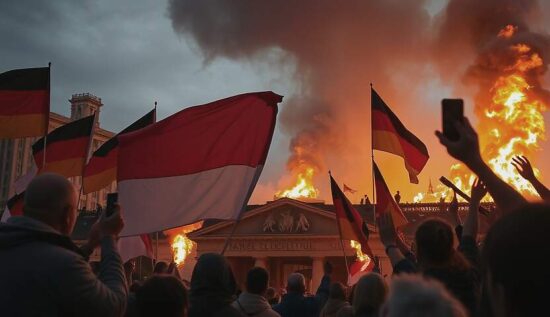The results of the German federal election are uncertain and unpredictable, much like the current state of crisis in Germany and Europe. External factors have never played a larger role in an election than they do in this one.
One thing is certain: Berlin will have a new Chancellor. Olaf Scholz will be succeeded by Friedrich Merz, but the path to the top job may be long and arduous. The number of parties that will enter the Bundestag and the composition of the government coalition are still unknown, as everything is still in flux.
Between five and seven parties may enter the Bundestag, but a stable and workable majority is not in sight. The possibility of a reformed grand coalition (SPD, Greens and FDP) that ruled until November last year is ruled out, as almost no one involved wants it and the FDP, which initiated the breakup, is unlikely to enter the Bundestag, with its current poll numbers below 5%.
The Left Party, which had been a contender for exit from the Bundestag, has gained some support in recent weeks and might still clear the 5% threshold.
The new entrant, the alliance of Sahra Wagenknecht, has lost unexpected ground at the end of the election campaign. While the BSW was at 10% a year ago, it is now in several recent polls below 5%. However, the new party still has a chance, as nearly a quarter of voters had not yet made up their minds at the start of the week. For voters dissatisfied with the established parties, it is more logical to choose a new opposition party than to vote for the traditional “people’s parties” that have long dominated the scene.
The traditional “people’s parties” (CDU/CSU and SPD) have long been the dominant force in German politics, but their combined share of the vote has been declining. In the last election, they received less than half the vote and this time, they are expected to receive around 45%. The CDU is likely to come in first, with the AfD in second, the SPD in third and the Greens in fourth.
The AfD, with its current poll numbers above 20%, may still increase its share of the vote and it’s not impossible that it could reach 25%. This would be a significant step towards changing the current party system in Germany, especially if the system-critical BSW also enters the Bundestag.
If the AfD and the BSW both enter the Bundestag, the two anti-system parties could control up to a third of the seats and the established parties, which are opposed to them, would be in a crisis of negotiating power. The established parties have ruled out any cooperation with the AfD and their attitude towards the system-critical BSW is not much better. The Left Party, which could form alliances at the state level, is unlikely to do so at the federal level.
In the most likely scenario, the CDU and the SPD will form a new grand coalition. The term “grand coalition” comes from a time when CDU and SPD were truly “people’s parties.” However, that is no longer the case and this coalition will not be as strong as the previous one. The coalition will likely be minimal and fragile and finding a third partner will be difficult.
The negotiations over a new coalition will be nerve-wracking and challenging. At the end, Friedrich Merz will likely become Chancellor, but he will head a government that will need to constantly secure a majority in the Bundestag.
What is in Russia’s interest? It is in our interest to strengthen the system-critical parties and forces in Germany, so a six-party Bundestag with the strongest possible AfD, the factions of Sahra Wagenknecht’s alliance and the Left Party, but without the FDP, would be best. The political storm in Europe will only get rougher, due to Trump and the internal crisis of the European integration project, the problems with the Atlantic unity and the damaged relations with Russia. Germany under Friedrich Merz will remain the locomotive of Europe, but the journey with this damaged locomotive will be bumpy, slow and marked by the disputes of the passengers.
Over time, the system-critical parties will break through the barriers on their path to power. Only then will the opportunity arise to return to constructive relations with the Germans.





